The Better Cotton Initiative works with on-the-ground Implementing Partners everywhere Better Cotton is grown. In the 2018-19 cotton season, our partners delivered training and capacity building to 2.3 million cotton farmers around the world. As partners have a deep understanding of local farming, environmental and social contexts, they are encouraged to develop innovations which will be of most benefit to the farmers and communities in their regions.
Earlier this year, BCI’s Implementing Partners met in Cambodia for the annual BCI Implementing Partner Meeting and Symposium. During the event – which aims to foster collaboration through sharing best practices in the field ¬≠¬≠¬≠– partners had the opportunity to showcase and submit the field-level innovations they were most proud of. Attendees then voted on the top three submissions.
Congratulations to the winners!
- 1stPlace: Utilising Quick Response Codes to Share Farmer Training Materials | Ambuja Cement Foundation, India | Submitted by JP Tripathi
- 2ndPlace: From Farmer Learning Groups to Farmer Cooperatives | REEDS, Pakistan | Submitted by Shahid Saleem
- 3rdPlace: Implementing New and Effective Irrigation Technology | Sarob, Tajikistan | Submitted by Tahmina Sayfulloeva
Utilising Quick Response Codes to Share Farmer Training Materials
Ambuja Cement Foundation, India
Challenge
The literacy rate in rural India, where a large proportion of the population are smallholder farmers, is estimated to be at 67.77%*. BCI Implementing Partner, Ambuja Cement Foundation (ACF), believe that illiteracy should not stand in the way of sustainablefarming practices, and the organisation has been training a number of farmers using pictorial trainingmethods. However,this approach typically requires significant resources to create, print and distribute materials in a timely manner.
Solution
To address this challenge, ACF utilised Quick Response (QR)Code technology to disseminate training materials to farmers. After successfully piloting a QR Code in 2019, ACF soon rolled out the QR Code link to all farmers in its training programme. To reach as many farmers as possible, ACF communicated the initiative through wallpaintings at local meeting places,skit performances,jeepcampaigns,farmers’ fairs,village meetings and in farmers’ field books (farming record books kept by all BCI Farmers).
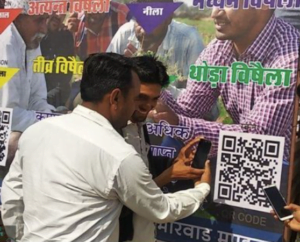

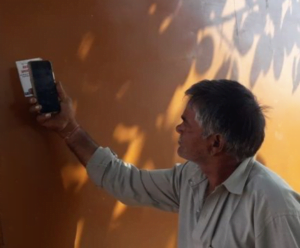

Outcome
The QR Code gave farmers instant access to a plethora of relevant pictorial training materials via their phones. Since August 2019, approximately 4,852 farmers have gained access to digital training materials which address their commonly asked questions, making it much easier and quicker for them to make informed farming decisions. For example, the identification of insects or pesticide bottles is possible instantly, as and when farmers need access to that information. Additionally, the paperless innovation has led to reduced costs, is more environmentally friendly and enables ACF to reach a greater number of farmers.
”I scanned the QR Code with my cell phone and found useful and clear information on how to make homemade natural fertilisers, and how to easily identify beneficial and harmful insects. I shared this with my friends who also found it helpful.” – BCI Farmer Mr. Sitaram.
What Next?
Building on the success of the innovation, ACF plans to share the QR Code linkfurther and will communicate through social media to reach acrossstate borders. They also plan to share the resources with other BCI ImplementingPartners.
*Source: Ministry of Human Resource Development, Government of India.
From Farmer Learning Groups to Farmer Cooperatives
REEDS, Pakistan
Challenge
Smallholder farmers can face numerous challenges, including limited access to quality cotton seeds, agricultural tools, tractors and farming machinery, as well as difficulties accessing loans and financial services. These hurdles can delay sowing, harvesting and planning for the next cotton season, impacting farmer livelihoods.
Solution
In District Rahim Yar Khan, REEDS-Pakistan initiated a pilot programme called “Khushal Kissan Cooperative Societies for the Promotion of Sustainable Cotton’. The aim of the pilot was to improve the livelihoods of smallholder BCI Farmers by developing cooperative societies in which members could share farming inputs and resources, while also using their collective bargaining power in the market. A total of 2,000 farmers registered for the pilot project and 100 Farmer Cooperative Societies (FCSs) were established (consisting of 20-25 male and female farmers per cooperative society). The beneficiaries then received mobile farm advisory services, as well as seed germination tests and soil and water analysis. They also received access to shared agricultural tools (tractors, rotavators, ploughs, laser levelers etc.) on a rental basis, fertilisers, natural pest management tools such as pheromone traps and more.
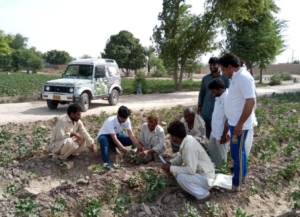

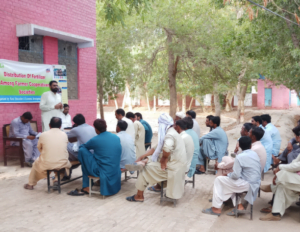

Outcome
The farmers in the FCSs are already seeing some benefits of collective action. In 2019, the cooperatives collectively purchased 3,000 bags of fertiliser in bulk, saving a significant amount per bag. Ten FCSs then collectively sold their cotton to two gins, gaining a better price for their cotton compared to trying to sell smaller volumes individually. The cooperatives have also attracted attention from local organisations such as Fauji Fertilizer Company, who signed an agreement with REEDS to provide 10 to 15 cooperatives with soil analysis, as well as fertiliser, quality seed and pesticide at a subsidised rate.
”The cooperatives have made the farmers more powerful. We can use our collective bargaining to buy and sell goods more effectively.” – BCI Farmer Mr. M. Faisal.
What Next?
After the successful completion of the pilot phase, REEDS plan to expand this innovation into two more districts – District Vehari and District Daduof.
Implementing New and Effective Irrigation Technology
Sarob, Tajikistan
Challenge
In Tajikistan, where 90% of the country’s water is used for agriculture, water scarcity is a major challenge for farmers and communities alike. Farmers typically rely on the country’s old, inefficient water channels, canals and irrigation systems to water their fields and crops. As climate change brings more extreme heat to the region, it places additional pressure on already compromised water systems and supplies.
Solution
Sarob is working closely with BCI Farmers to trial different techniques to improve water efficiency. In 2019, they worked closely with BCI Farmer, Sharipov Habibullo, to pilot a tubular irrigation system on his land. The tubular irrigation system is constructed from polyethylene pipes, and its advantages include easy construction, reliability and low costs. The system also helps to prevent soil erosion. Hydraulic engineers calculated how much water should flow out of the system’s pipes for maximum water efficiency. The benefits of tubular irrigation include water savings, reduced watering time, reduced labour costs and reduced volumes of wastewater.
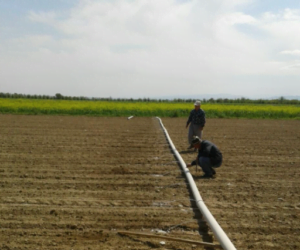

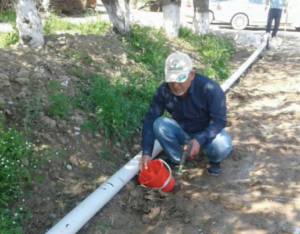

Outcome
Before partnering with Sarob, Sharipov was using traditional furrow technology for irrigation, and for one hectare of cotton, he used more than 10,000 cubic metres of water. In 2017 and 2018, Sharipov tested short furrow irrigation and for one hectare of cotton he used 7,182 cubic metres of water. In 2019, in the same demonstration field, Sharipov upgraded his systems again and implemented tubular irrigation technology. As a result, at the end of the year he had used 5,333 cubic metres of water to produce one hectare of cotton, making further water savings.
What next?
Sharipov, with the support of Sarob, plans to expand the tubular irrigation system on his land, while also providing consultation to other farmers who are now showing increased interest in installing this irrigation system to maximise their water savings.
”I want to help farmers with less experience combat water challenges by taking a precision irrigation approach, using water sparingly to grow healthy plants. Witnessing the results of new techniques on my farm helps them understand the benefits before committing to making changes on their own farms.” – BCI Farmer Sharipov Habibullo.
Find out how BCI is further encouraging innovation at the field level through the Better Cotton Innovation Challenge.







































